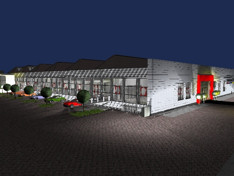Jul 9 2008
The building on the site of BASF Coatings in Münster has made history – and has experienced painting history. The Glasurit training center was inaugurated 24 years ago, and for many years was counted as one of the most modern training facilities for spray painters in Europe.
The building, housing classrooms, spraybooths as well as preparation and work bays, was the venue for thousands of training courses with tens of thousands of participants. However, after nearly a quarter of a century of service, the novelty had worn off and times – and hence also the content and methods of spray painter training – had changed. BASF Coatings has now embarked on a program of complete rebuilding and refurbishment, bringing the training center up to the latest state of the technical art.

For Jürgen Book, head of Customer Service at BASF Coatings, one thing is certain: “We are making the RCC a hub of our European network.” The RCC will, he says, be the flagship for the training activities of the Strategic Business Unit Automotive Refinish Coatings. “We have to convey the painting process as an experience,” he continues, and referring to the Glasurit brand and its trademark and logo, adds with a smile: “The parrot is being given a new nest”.
To enable the professional trainers to pass on their knowledge and skills to the customers in the form of seminars and hands-on trainings and teach them how best to process the paints and so equip them and their businesses to meet future challenges, more than just cosmetic improvements to the building were necessary. To maintain the high quality of the training in the long time and optimize it still further, the seminar rooms are being equipped with advanced media technology and are being supplemented by a modern color training area.
But this is not the only fundamental alteration the RCC is undergoing. “Our aim at the RCC in future is also to be able to simulate efficient workshop processes and so help the customers to consistently improve the efficiency of their businesses,” Jürgen Book explains. “And to this end, extensive modernization is necessary.” Modernization involving a volume of some three million euros and hence a substantial investment at the Münster site. “When the rebuilding is completed,“ Book continues, “our training center in Münster will be one of the best in Europe.”
The first step in the project is to gut the interior of the building. But the external appearance of the RCC will also change beyond recognition, with large areas of glass being installed in the facade to let in lots of daylight and create a bright, open atmosphere. A characteristic feature of the new RCC is a likewise glazed foyer, where visitors and customers can not only relax during their visits and courses, but also obtain all the latest information. A show car zone will round off the exclusive entrance area.
A new space structure in which the internal and customer-related areas are meaningfully separated from each other will ensure smoother operation. The offices themselves will be organized along team lines. For the first time, all Customer Service personnel, who are currently accommodated in several buildings, will be gathered in one place.
Carrying out all the improvements will take until July 2009 – the date scheduled for reopening of the Refinish Competence Center. The earliest work on the facade of the building already started in December of last year, while from July to December 2008, the RCC will be completely closed. “So we can really swing the hammer,” Jürgen Book says with a smile. The first training courses in the new center are scheduled to start at the beginning of the new year.
Until then, the customer training activities will be held instead at training centers of BASF Coatings in Belsele (Belgium), Maarssenbroek (Holland), Wangen (Switzerland) and Eugendorf (Austria), as well as at the training center of the Toplac bodyshop in Dresden and the training facilities of the bodyshops Lange (Grimma), Hofmann (Mainleus), Restemeier (Osnabrück) and Stadlbauer (Oberursel).
The rebuilding project, which is being carried out under the direction of Site Engineering, will take a whole year to produce a state-of-the-art training facility which is virtually in a class of its own. Looking ahead, Jürgen Book says: “There is certainly some sadness at seeing the old building disappear, but in return, the sense of anticipation about the new training center is all the greater.”